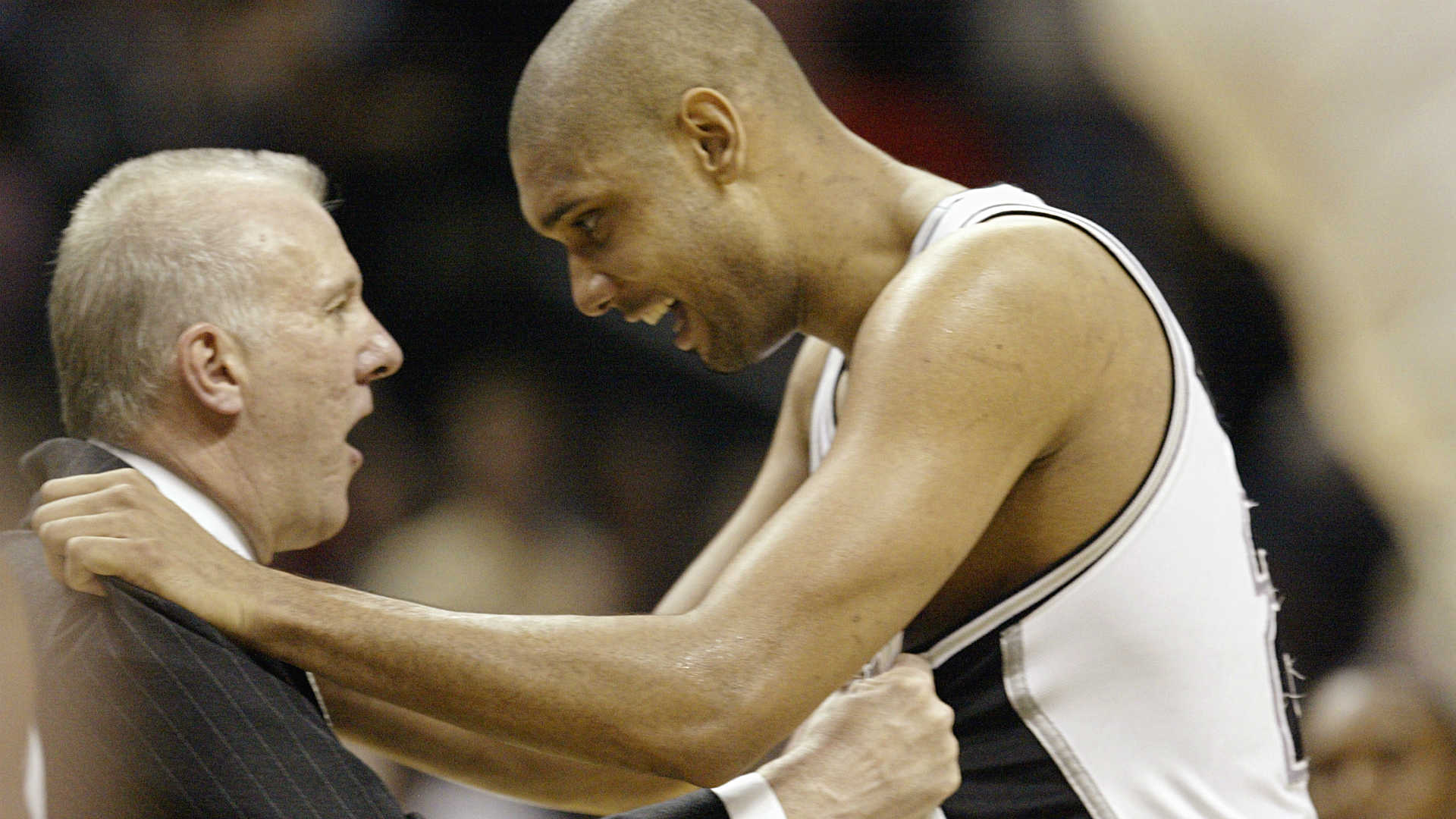The NBA celebrates NBA 75 roster players almost daily from now until the end of the season. Today’s honoree is Tim Duncan, the Spurs icon who, in an early college scouting report in The Sporting News, projected himself as “at least” an NBA All-Star on multiple occasions. That was an understatement. This story, from the May 26, 2003 issue of The Sporting News, announced Duncan as TSN’s Player of the Year for the second consecutive season.
When Tim Duncan was a rookie, the Spurs coaching staff put him through a series of drills. The coaches wanted to test his jump hook, bench shot, footwork, agility and power moves. After each movement, they had the same reaction: wide smiles.
Six seasons later, Duncan’s coaches are still smiling. And why not? With Duncan at the helm, the Spurs won a championship and won or shared four division titles. They have finished at least 24 games above .500 each season. Duncan, meanwhile, has rocketed through the ranks of the NBA’s best players, racking up awards at almost the same rate as he racks up points and rebounds. If he’s not yet one of the top 10 players of all time, he will be after a season or two like the last six.
Duncan, 27, has another SPORTING NEWS Player of the Year trophy to add to his hardware collection. He became the seventh player to win the award in consecutive years, receiving 12 votes from the 20 NBA player staff executives who participated in the vote. Kevin Garnett was second with five votes. The other votes went to Kobe Bryant (two) and Tracy McGrady (one).
Already this season, Duncan became the eighth player to be named the league’s Most Valuable Player in consecutive seasons. He was named the All-NBA first team, becoming the sixth player to be named to the NBA first team or one of its predecessor leagues in each of his first six seasons. He was also included in the first team’s All-Defensive team for the fifth consecutive season. About the only team you won’t find him on is the All-Interview team, as they are just as adept at keeping their personality out of the public eye as they are at making a 15-foot bench shot. Quote example after he was named MVP: “I was playing to win games and be the best team in the league, and that was it. It doesn’t matter who gets the glory.”
This season will be remembered as one in which numerous young stars took their games to new heights. Kevin Garnett, Tracy McGrady, Kobe Bryant and Dirk Nowitzki enjoyed a stretch or two as the best players in the league. Duncan, meanwhile, was advancing at his usual pace. The only spectacular thing about his game are the results: 23.3 points, 12.9 rebounds, 2.9 blocks and, of course, 60 wins. As his teammate David Robinson put it: “He’s not one of the guys that everyone talks about all the time, but when you look at his game, you can’t deny that he’s the most effective player on the court.”
It’s been like that every season in what has been a career few can do more than dream of: Senior Player of the Year at Wake Forest, first pick in the 1997 draft, Rookie of the Year in ’98, Player MVP of the Finals in ’99 and League MVP and TSN Player of the Year in ’02 and ’03.
Duncan was still in Wake Forest when the league announced its top 50 players, but if the vote were to take place today, it would be for sure. “I would vote for him,” says NBA scouting guru Marty Blake, who was on the panel that chose the top 50. “I remember seeing him in his second year playing for the USA in the Goodwill Games. I said to my wife, ‘Well, we don’t need to see him again.’ It was that cool. He likes to play, he likes his teammates and, like the truly great ones, he makes the people around him better ”.
Aside from the inconsistency of the free throw line, about the only criticism anyone has had of Duncan has been that he is too quiet for a superstar. Popovich wants his best player to show that he is in command, not that he sits quietly in the shadows. In recent seasons, Duncan has become more vocal on the court.
“When Avery (Johnson) left, there was a leadership void in our club,” says Popovich. “Initially, Timmy and I had to talk about it. He’s an introspective person and likes to lead by example. But he learned a lot from Avery. Slowly but surely, he realized when he needed to say things during games. himself, not as a cheerleader, but as a good teammate ”.
Duncan has also improved his own game, although one scout says: “He was so good when he came in that I don’t know if you can say he has improved.”
The improvement is subtle. For example, Duncan has learned to pass out on double teams. You also know how, when you need to, take charge of a game.
“Before, it didn’t matter what we did on the court, he did it and didn’t say anything, because he’s respectful,” says Popovich. “Now he feels that he wants the ball in the important moments of the game and he tells me so.”
And what he does with it usually makes Popovich very happy.

